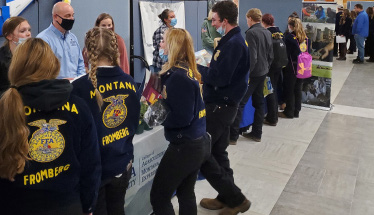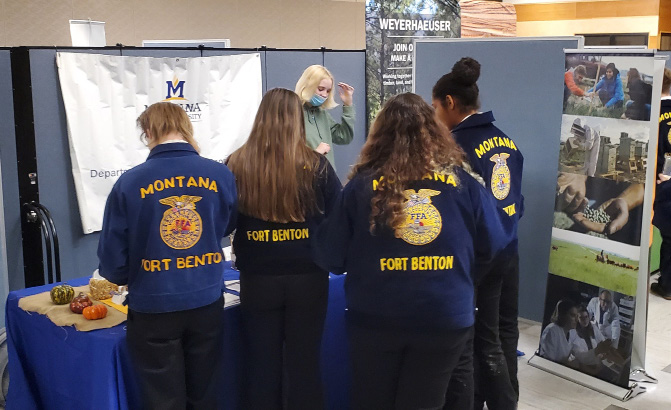Outreach and Engagement
Justin Gallagher presents natural disaster research at conferences
 Justin Gallagher presented his research, “Natural Disasters that Cause No Damage: Accounting for the
Selective Reporting of Weather Damage” on two occasions over the summer.
Justin Gallagher presented his research, “Natural Disasters that Cause No Damage: Accounting for the
Selective Reporting of Weather Damage” on two occasions over the summer.
The first presentation occurred at the 2021 annual summer conference of the Association of Environmental and Resource Economists, held virtually June 2-4. He chaired the "Natural Disasters" session at the conference, which also included presenters from Oregon State University, Pennsylvania State University and Université de Sherbrooke.
In September, Dr. Gallagher was invited to present the same paper for a research seminar at the University of Nevada, Las Vegas.
Eric Belasco delivers virtual international presentation
Eric Belasco presented, "The Impact of Policy Design on the Distribution of Agricultural Support
Payments," in a virtual lecture as part of the Zhejiang University Summer Seminar
Series.
In May 2019, Dr. Belasco traveled to China with Agriculture in a Global Context students
and their chaperones, where they visited Zhejiang University in Hangzhou.
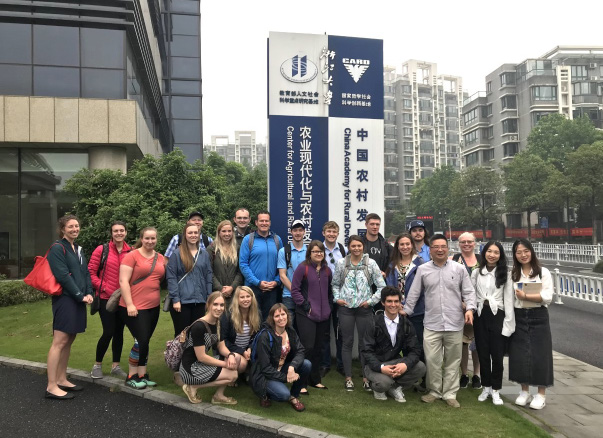
Agriculture in a Global Context students, chaperones, and course instructor Eric
Belasco, are shown in front of Zhejiang University in Hangzhou, China.
AGECONMT contributors share insight on myriad timely issues
 Summer and fall posts from AgEconMT researchers covered timely issues in labor, agriculture,
energy, food assistance, climate, politics and more.
Summer and fall posts from AgEconMT researchers covered timely issues in labor, agriculture,
energy, food assistance, climate, politics and more.
Contributors and their topics between May and November were:
- Mapping state-by-state crop insurace selections and relative costs — Kate Fuller
- Montana gains an electoral seat by a slim margin — Joel Schumacher
- Montana has a labor shortage. Good news? — Brock Smith
- Seasonal farm labor and COVID-19 in 2020 — Diane Charlton
- Farm debt relief under the American Rescue Plan Act — Dan Bigelow
- The Supplemental Nutrition Assistance Program and household food consumption — Yang Yu
- The mystery of the missing drought impacts — Nick Hagerty
- The health effects of hazy air — Brock Smith
- Has Montana's labor force shrunk? — Joel Schumacher
- Seasonal farm labor and increasing incidence of COVID-19 — Diane Charlton
- SNAP benefit is permanently increased but food securing still faces challenges — Yang Yu
- Recapping the 2021 drought — Nick Hagerty
- No big changes in Montana ag producers' financial sentiments from 2020 — Kate Fuller
- The Northwest power plan and the future of energy —Brock Smith
- Help wanted and H-2A — Diane Charlton
The primary objective of AgEconMT is to provide timely and relevant information that will enable agricultural producers in the northern Great Plains to better understand the economic issues that affect their businesses and communities.
To read the above posts and others, go to ageconmt.com.
Diane Charlton shares farm labor expertise on CBS 'Sunday Morning'
 Diane Charlton appeared on CBS’s “Sunday Morning” to discuss the nationwide agricultural
labor shortage and the role of immigrant workers in the economy. The segment titled
"Invisible People” aired June 27. Dr. Charlton, an assistant professor in the DAEE,
studies the economics of agricultural production with a focus on labor and migration.
Diane Charlton appeared on CBS’s “Sunday Morning” to discuss the nationwide agricultural
labor shortage and the role of immigrant workers in the economy. The segment titled
"Invisible People” aired June 27. Dr. Charlton, an assistant professor in the DAEE,
studies the economics of agricultural production with a focus on labor and migration.
The piece centered on the story of Shay Myers, a farmer in eastern Oregon, who put out a call on social media in April asking the public to harvest $180,000 worth of asparagus from his land, free of charge. The farm laborers who would have been harvesting the crops were held up at the Mexico border due to trouble with their H-2A visas, and Myers preferred to give the 300,000 pounds of produce away rather than have it rot on his fields. Six thousand people answered that call, but the profit from the crop was lost to Myers and his business.
In the segment, Dr. Charlton noted that the H-2A visa program, which allows immigrants to come into the U.S. temporarily for agricultural work, hasn’t been updated for years. The program is complex and difficult for employers to navigate, she said.
However, relying on local workers and immigrants, many of whom are unauthorized, to perform seasonal farm work is becoming increasingly more difficult as well, since fewer rural Mexicans are interested in doing farm work. When employers cannot find sufficient workers to harvest their crops, it generates major losses for farmers like Myers.
“It’s not easy for the farmers; it’s not easy for the workers; it’s far from ideal,” said Dr. Charlton. “There is currently a bill in Congress to try to reform the H-2A program to make it easier for producers to use that program and provide a path to citizenship for those who participate in the program. Unfortunately, there have not been better solutions for many decades.”
Read the full story at: https://www.montana.edu/news/21298/msu-economist-featured-on-cbs-sunday-morning
“Invisible People” can be viewed at: https://www.youtube.com/watch?v=vch2RtfHbtQ.
-MSU News Service
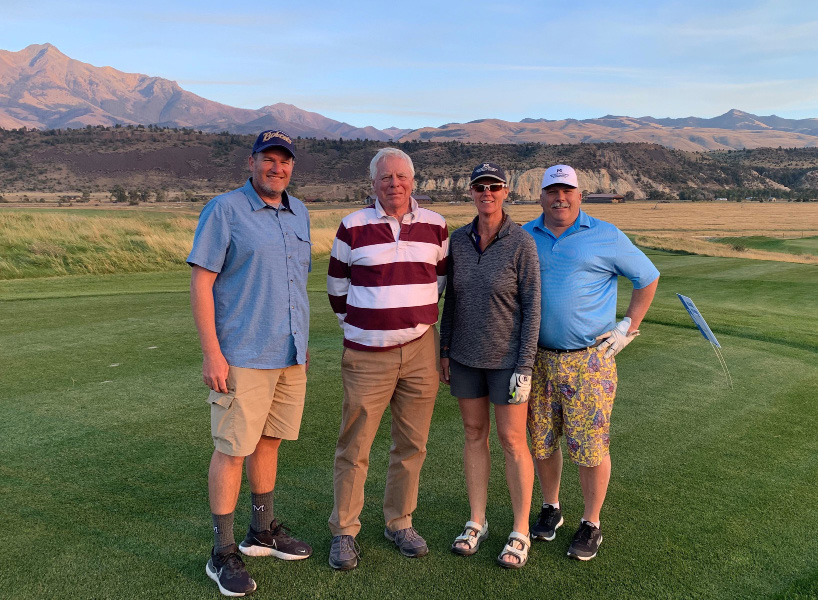
Eric Belasco, Vince Smith, Peggy Lamb and Darrin Boss teamed up to represent the College
of Agriculture at the Montana
FFA Foundation Blue and Gold golf tournament, held Sept. 17, at the Rising Sun Golf
Course in Emigrant.
Fall 21 Academic Research Seminar Series
The DAEE resumed its in-person Academic Research Seminar Series this fall, with faculty
members hosting scholars from around the U.S. who presented research on a wide range
of topics. To suggest speakers or volunteer for the Spring 22 series, contact Dan Bigelow at [email protected] or Mariana Carrera at [email protected].
| Date | Presenter Host | Institution | Seminar Title |
| 8/26 | Michael McCullough Hosts: Gary Brester, Vincent Smith |
California Polytechnic | Beer Excise Taxes and the Craft Beverage and Modernization Tax Reform Act |
| 9/10 | Vincent Smith Host: Dan Bigelow |
IRAEA | Industry Influence and Agency Decision Making: Evidence from USAID |
| 9/17 | Michael Kofoed Host: Greg Gilpin |
West Point | Zooming to Class: Experimental Evidence on College Students' Online Learning During Covid-19 |
| 9/24 | Ryan Hill Host: Nick Hagerty |
Brigham Young University |
Race to the Bottom: Competition and Quality in Science |
| 10/1 | Katrina Jessoe Host: Dan Bigelow |
University of California Davis |
The Long-Run Industry Impacts of Pricing Externalities: Groundwater and Agricultural Land Use |
| 10/15 | Sarah Miller Host: Mariana Carrera |
Michigan Ross | The Economic Consequences of Being Denied an Abortion |
| 11/5 | Mike Anderson Host: Justin Gallagher |
University of California, Berkeley |
Uber and Alcohol-Related Traffic Fatalities |
Fall 21 Sack Lunch Seminars
The DAEE resumed its in-person Academic Research Seminar Series this fall, with faculty
members and other MSU scholars presenting working research to an audience of peers.
To suggest presenters or volunteer for the Spring 22 series, contact Diane Charlton at [email protected].
| Date | Presenter | Seminar Title |
| 9/15 | Justin Gallagher DAEE Assistant Professor |
Retrospective Voting and Natural Disasters that Cause No Damage: Accounting for the
Selective Reporting of Weather Damage |
| 9/27 | Mariana Carrera DAEE Assistant Professor |
Social Norms, Social Recognition, and Covid-19 Vaccination: A Field Experiment on a College Campus |
| 10/25 | Pamela Meyerhoffer Postdoctoral Researcher |
Does Paid Family Leave Cause Mothers to Have More Children? Evidence from California |
| 11/1 | Wendy Stock DAEE Professor |
Paid Leave and Older Workers |
| 12/6 | Iker Saitua Visiting Researcher |
The Rise and Fall of the Sheep Industry in Montana |
| 12/13 | Thomas Austin and Bill Kleindl Land Resources and Environmental Sciences |
The Economic Consequences of Being Denied an Abortion |
Rich Ready delivers climate policy seminar for IoE Rough Cut series
 Richard Ready presented “Federal Climate Policy: What Works and What’s Possible,” on Sept. 29, as part of the Institute on Ecosystems Rough Cut seminar series.
Richard Ready presented “Federal Climate Policy: What Works and What’s Possible,” on Sept. 29, as part of the Institute on Ecosystems Rough Cut seminar series.
During the seminar, Dr. Ready discussed different policies the federal government has in place — or could put in place — to reduce greenhouse gas emissions, and provided an overview of climate policies included in the Bipartisan Infrastructure Bill (which has since been passed into law) and the Build Back Better budget sequestration bill (which is still being debated and revised in Congress).
Dr. Ready is a professor in the DAEE whose research explores how people benefit from, and value, the services provided by ecosystems. His research topics have included environmental health, climate change, invasive species, landscape change and outdoor recreation.
His IoE Rough Cut seminar and others can be viewed online at: https://montanaioe.org/rough-cut
Mark Anderson presents research at Stanford University
 Mark Anderson presented, "The Federal Effort to Desegregate Southern Hospitals and the Black-White Infant Mortality
Gap," in a virtual lecture to the Stanford University Department of Economics in May.
Mark Anderson presented, "The Federal Effort to Desegregate Southern Hospitals and the Black-White Infant Mortality
Gap," in a virtual lecture to the Stanford University Department of Economics in May.
The research, co-authored by Kerwin Charles and Daniel Rees, examines the 1966 law that barred southern hospitals from participating in Medicare unlessthey discontinued the long-standing practice of racial segregation.
Using data from five Deep South states, the authors found that gaining access to an ostensibly integrated hospital had no effect on the Black-White infant mortality gap. Similarly, there is little evidence that the federal hospital desegregation campaign contributed to the trend towards in-hospital births among southern black mothers.
These results are consistent with descriptions of the campaign as producing only cosmetic changes and illustrate the limits of anti-discrimination policies imposed upon reluctant actors.
Read the study at: https://bit.ly/3G9TIGH
Greg Gilpin presents library research at multiple events
 Greg Gilpin and co-authors presented, “Public Library Physical Infrastructure Improvements and Student Achievement,” at the ODIS Symposium: New Data and Directions in Research on Public Libraries in
January, the American Education Finance and Policy annual conference in March, and
at the National Bureau of Economic Research Summer meeting in July.
Greg Gilpin and co-authors presented, “Public Library Physical Infrastructure Improvements and Student Achievement,” at the ODIS Symposium: New Data and Directions in Research on Public Libraries in
January, the American Education Finance and Policy annual conference in March, and
at the National Bureau of Economic Research Summer meeting in July.
The research on how public library infrastructure improvements increase access to
public libraries and subsequent growth in children’s reading achievement has gained
substantial national media attention as policymakers grapple with how to expand public
infrastructure to improve community development.
Local governments spend over $12 billion annually funding the operation of 17,000
public libraries in the United States, yet little is known about their effects of
community development and student achievement.
Dr. Gilpin and co-authors Dr. Ezra Karger and Dr. Peter Nencka use data describing the near-universe of public libraries to show that public library investment increases children’s attendance at library events by 18%, children’s checkouts of items by 21%, and library visits by 21%.
Increases in library use translate into improved test scores in nearby school districts: a $1,000 or greater per-student capital investment in local public libraries increases reading test scores by 0.02 standard deviations. Comparing their results to building a new public elementary school building, the researchers find that library capital spending shocks generate average test score increases that are 29% the size of a school capital spending shock at 15% of the cost.
Visiting scholar Iker Saitua shares research on sheep industry
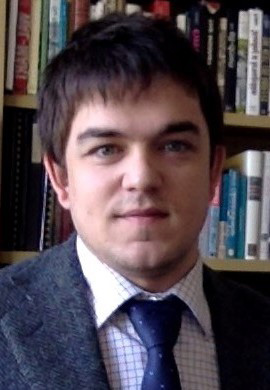 Iker Saitua spent three months with the DAEE working on and sharing his research related to the
economic history of Montana's sheep industry.
Iker Saitua spent three months with the DAEE working on and sharing his research related to the
economic history of Montana's sheep industry.
An assistant Professor in the Department of Public Policy and Economic History at University of the Basque Country (UPV/EHU) in Spain, his research interests include agricultural history, animal history, and livestock industry in the American West.
Dr. Saitua has published widely on the sheep industry and Basque immigrant labor in the American West. His work on the history of Basque sheep workers and the industry that pulled them to the West has resulted most recently in his book: Basque Immigrants and Nevada’s Sheep Industry: Geopolitics and the Making of an Agricultural Workforce, 1880-1954 (University of Nevada Press, 2019).
He is currently working on the American sheep industry and its export-driven economy in the 19th and 20th centuries.
During his time at Montana State, Dr. Saitua gave the following presentations:
- Oct. 7: "Dealing with Trade: Economic Effects of Tariff Measures on the Sheep Industry of the American West in the 1890s," at the 34th Conference of the International Association of Applied Economics-ASEPELT.
- Oct. 9: Public talk on "The Life and Times of John Etchart: Basque Immigrant, Rancher, and Entrepreneur in the American West," at the Valley County Pioneer Museum in Glasgow.
- Oct. 14: “The Economic Impact of Sheep Diseases and their Control in the American West during the Late Nineteenth and Early Twentieth Centuries,” at a Bair Ranch Foundation seminar in the Department of Animal and Range Sciences.
- Dec. 6: "The Rise and Fall of the Sheep Industry in Montana," at a DAEE Sack Lunch Seminar.
DAEE engages with FFA students at Career Fair
For the second year, the DAEE hosted a booth at the FFA Career Fair, held Nov. 13,
during the annual Montana FFA Ag Expo.
More than 1,600 middle and high school students from around the state took part in the event, which provides educational and development opportunities, tours of campus research facilities, and the chance to compete in livestock judging and a quiz bowl, among other events.
The DAEE joined up with the College of Agriculture to offer a "super booth" with giveaways
and trivia. Students who stopped by learned about the different DAEE majors and what
type of career options available to them.
